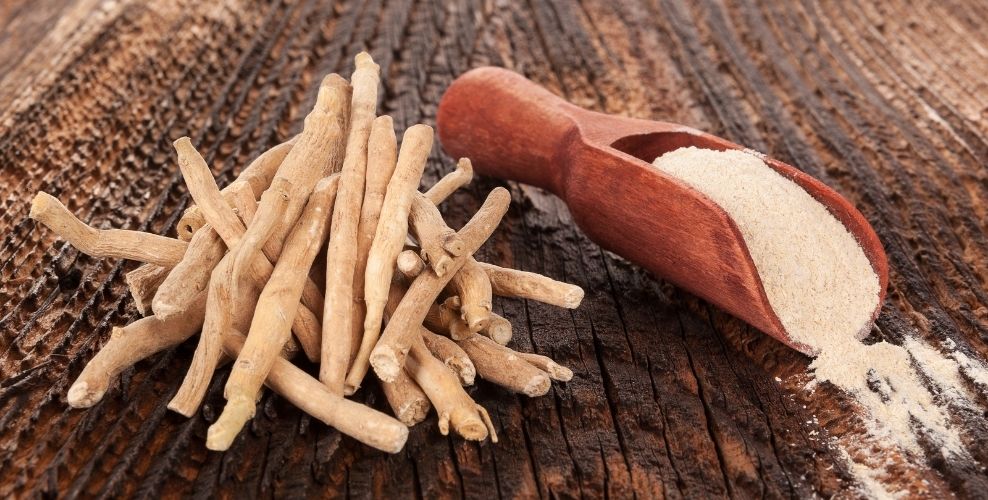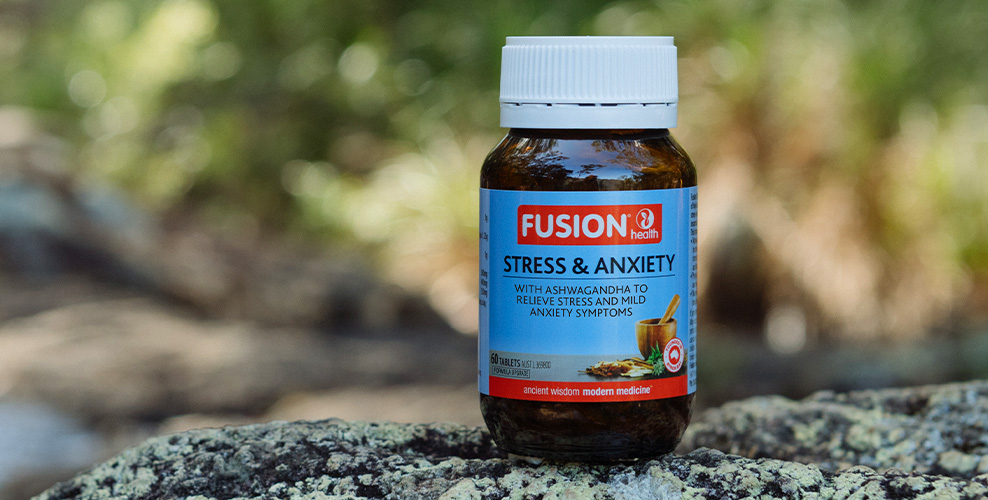What is ashwagandha? Everything you need to know about this helpful herb
Sophia Power, BA Media
Quick overview:
- Everything old is new again! Ashwagandha has been used in traditional Indian medicine since around 6000 BC and is still one of the most popular herbal supplements in India.
- Ashwagandha’s worldwide rise in popularity over the past few years is mostly thanks to its status as an adaptogen. An adaptogen is a type of herbal medicine that can help to reduce symptoms of stress and improve the body’s overall stress response.
- KSM-66® is a standardised extract of ashwagandha with clinically proven benefits, including relief from stress and mild anxiety symptoms.

In fact, ashwagandha is anything but new. Its roots go back thousands of years in India where it’s one of the most popular herbs in traditional Ayurvedic medicine. Because of its long history and popularity, it’s set the wellness world alight with talk of its many benefits. If you’ve been wondering how ashwagandha could help you, keep reading to learn about how this adaptogenic herb could fit into your wellbeing routine.
What is ashwagandha?
Ashwagandha, also sometimes called withania, winter cherry or Indian ginseng, is a type of shrub that has been used as a herbal medicine throughout India, Southeast Asia, Africa and the Middle East for hundreds of years. The root is the main part of the plant that is used in Ayurvedic medicine as an adaptogen.[1] Adaptogens are any substances that support stress resistance in the body.[2]
Ashwagandha is classified as a nightshade. The herb belongs to the Solanaceae family that includes tomatoes, potatoes, peppers and eggplant.
History of ashwagandha
Traditional Ayurvedic medicine is an ancient medicine native to India. Ashwagandha is one of the most prized herbs of Ayurvedic medicine and its use can be traced back to 6000 BC.[3]
The word ashwagandha in Sanskrit literally translates to ‘smell of a horse’ and it was said to give the ‘power of a horse’ when consumed as a rejuvenating tonic. This does give some small indication of how it has historically been regarded! [4]
Traditionally, and even today in some places, ashwagandha is often ground up into a fine powder that is then mixed together with water, ghee or honey before being consumed.[3]

Why is ashwagandha so popular right now?
If you looked at India’s reported consumption of ashwagandha alone, you’d assume it must be doing something good. India consumes over 100 metric tons of the stuff every year, making it the fourth most consumed botanical medicine in the country.[5]
Why is it that an adaptogenic herbal medicine has captured so many peoples’ attention? If you take a moment to consider the prevalence of stress symptoms in modern society, the rise in popularity of this Ayurvedic superstar herb is not such a mystery.
We talk about the importance of managing stress a lot on our blog - strategies like mindfulness meditation, eating a variety of whole foods and spending time in nature, which are all vital to prioritising your wellbeing. However, the fact is that sometimes you might need extra support to reduce stress symptoms. That’s where expertly formulated supplements containing herbal medicines come in.
Just as many of us reach for vitamin C to support the immune system when we feel the beginnings of a cold, more people are now reaching for ashwagandha to support the symptoms of stress.
Benefits of ashwagandha
Thanks to the increasing interest in ashwagandha, more and more studies are now being undertaken to understand why it’s so popular. Based on what is currently known about ashwagandha, it can be confidently used to support the body’s ability to cope with stress.[6]
One area of research has looked into how ashwagandha promotes the body’s adaptation to stress.[6] In a recent high-level study, ashwagandha extract was found to significantly support the body’s ability to adapt to stress over a 60 day period.[6]
The stress-reducing effects might help to explain why ashwagandha is also beneficial in reducing mild anxiety symptoms.
In Western herbal medicine, ashwagandha is one of the most widely used herbs. It’s more often referred to as withania. Since 2019, ashwagandha has quickly become the go-to herbs for relieving stress symptoms and that’s certainly what the evidence suggests.[7]

What other herbs can ashwagandha be used with?
Ashwagandha is often paired with other herbs such as polygala, citrus peel, poria mushroom, holy basil and magnolia.
Combining polygala with ashwagandha is a match made in heaven. Polygala is a herb often used in traditional Chinese medicine (TCM) to reduce the symptoms of mild anxiety, including restlessness and irritability. In TCM, shen means mind and spirit - polygala is traditionally known in Chinese medicine to calm shen.
Ashwagandha is also commonly used alongside citrus peel, an herb traditionally known in Chinese medicine for its benefits in both improving digestive weakness and regulating qi (vital energy) to relieve abdominal bloating and fullness, nausea and burping.
Ashwagandha supplements
So, if you’ve decided that you could really benefit from ashwagandha, the next step is deciding on the right product for you.
Standardised extracts such as KSM-66®, a highly concentrated root extract, help to take the guesswork out of how consistent your ashwagandha supplement is going to be. Standardised extracts contain a guaranteed amount of the active plant compounds so you know exactly what you’re getting.
For relief from stress and the symptoms of mild anxiety, try our Fusion Stress & Anxiety formula which contains KSM-66® standardised extract to relieve the symptoms of stress and mild anxiety and help the body cope with stress, along with polygala, holy basil, magnolia, citrus peel, and poria mushroom.

Stress is a fact of life. Sometimes you can be so busy doing the things you love that you haven’t even stopped to notice how it might be impacting your body. A little bit of stress can even be a positive thing. How your body adapts to stress is another story. If you feel your ability to cope with stress is waning, or symptoms of stress and mild anxiety are becoming commonplace, ashwagandha could just be the herb for you.
Always read the label and follow the directions for use.
References:
- Verma N, et al. Complementary Therapies in Medicine 2021;57:102642.
- Panossian A, et al. Pharmaceuticals (Basel) 2010;3(1):188-224.
- Singh N, et al. M. Afr J Tradit Complement Altern Med 2011;8(5): 208-213.
- Chandrasekhar K et al. Indian J Psychol Med 2012;34(3):255-262.
- Engels G, et al. HerbalGram 2013;99:1-7.
- Lopresti AL, et al. Medicine (Baltimore) 2019;98(37):e17186.
- Nutritional Outlook. Accessed December 2021, written February 2021 from https://www.nutritionaloutlook.com/view/ashwagandha-sales-grew-in-2020-experts-discuss-how-it-will-lead-the-mainstreaming-of-adaptogens-in-2021-2021-ingredient-trends-to-watch-for-food-drinks-and-dietary-supplements



















